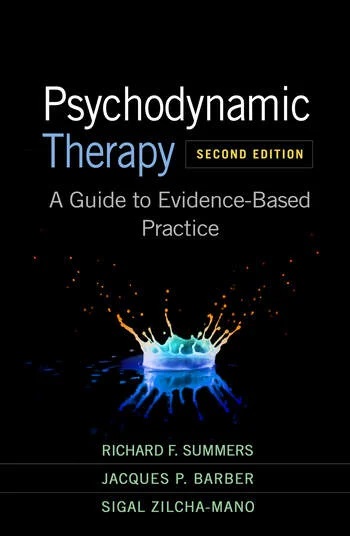Psychodynamic Therapy: A Guide to Evidence-Based Practice: Second Edition

Book Details
- Publisher : Guilford Press
- Published : 2024
- Cover : Paperback
- Pages : 412
- Category :
Individual Psychotherapy - Catalogue No : 97704
- ISBN 13 : 9781462554072
- ISBN 10 : 1462554075
Reviews and Endorsements
This book amply demonstrates the relevance of psychodynamic therapy in mental health practice today. The underlying concepts are fully explained and firmly rooted in the context of contemporary psychology. Look no further for a readable and well-informed account of current practice! The authors take readers by the hand, leading them chapter by chapter through the phases of contemporary psychodynamic treatment. Newcomers will learn about the distinctive features of the clinical relationship, the personalized nature of the approach, and how to implement treatment in their current practice, even if using telepsychotherapy; seasoned clinicians will be brought up to date on the core elements of contemporary psychodynamic therapy.
Anthony W. Bateman, FRCPsych, Visiting Professor, University College London, United Kingdom, and Copenhagen University, Denmark
Psychodynamic psychotherapy is a powerful clinical tool. This approach - and the evidence for its effectiveness - needs to be clearly introduced and articulated to new therapists and those who wish to broaden their skills. Summers, Barber, and Zilcha-Mano illuminate crucial therapeutic ideas and applications in this readable, clear book. Like the first edition, the second edition of this guide is certain to become a mainstay in psychotherapy curricula.
Barbara Milrod, MD, Department of Psychiatry and Behavioral Sciences, Albert Einstein College of Medicine
Trainees often ask for a book to help them organize their thinking and structure the treatment in psychodynamic psychotherapy. This book will gratify their wishes, with an approach that is both general and personalized. The book has the voice of a supervisor - kind, clear, honest, direct, and human. Varied, realistic case examples are accompanied by reflection questions that model how an experienced practitioner might think. The authors speak to the questions, fears, and decisions therapists face, making psychodynamic practice accessible and appealing without glossing over its complexity.
Jordan Bate, PhD, Ferkauf Graduate School of Psychology, Yeshiva University
This is among the very best books on practicing psychotherapy. The authors beautifully illustrate how to apply evidence-based principles to particular patients’ problems - the chapters on psychodynamic formulation, therapeutic focus, and building a personal story provide rich material for individualizing treatment. Therapists at all levels of training and from diverse theoretical perspectives will benefit from reading this excellent second edition.
George Silberschatz, PhD, Department of Psychiatry and Behavioral Sciences, University of California, San Francisco; President, San Francisco Psychotherapy Research Group
The second edition retains the superb descriptions of the major psychoanalytic models and psychodynamic approaches, along with illustrative clinical vignettes, that made the first edition so compelling. The book highlights modifications of traditional approaches that make psychodynamic psychotherapy applicable to a broader range of patients and increase its effectiveness. The second edition incorporates the expanding evidence base for psychodynamic therapy and includes cases with more diversity in age, race, gender, sexual orientation, and nationality. The new chapter on telepsychotherapy brings therapists up to date on the opportunities and challenges of this growing form of therapy and contains valuable clinical recommendations. This volume is essential reading for trainees and experienced mental health professionals.
Fredric N. Busch, MD, Department of Psychiatry, Weill Cornell Medical College, and faculty, Columbia University Center for Psychoanalytic Training and Research

